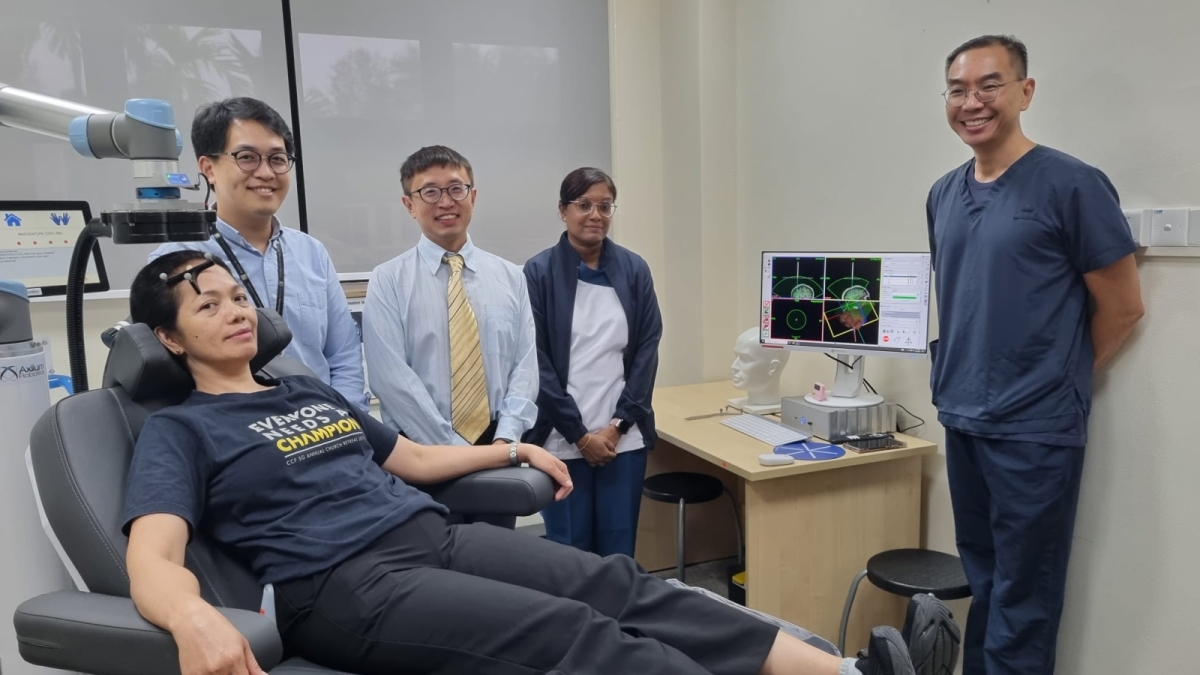
Dr Tor Phern Chern (right), Principal Investigator (PI) and A/Prof Thomas Yeo (third from left), co-PI for the clinical trials with a few members of the Transcranial Magnetic Stimulation (TMS) treatment team from IMH (Photo from NUS Yong Loo Lin School of Medicine)
The Singapore trials will use a locally- developed targeting algorithm.
If it takes months to years to manage treatment-resistant depression (TRD), Singapore is not one to wait that long and has embarked on trials of personalised transcranial magnetic stimulation (TMS) tailored for Asian brains.
The Institute of Mental Health (IMH), which together with the Yong Loo Lin School of Medicine at the National University of Singapore (NUS Medicine) is spearheading the trials, defines TMS as a “non-invasive therapeutic modality that utilises magnetic fields to modulate neural activity in specific brain regions.”
The trials, namely Asia Pacific Individual Connectomics – Transcranial Magnetic Stimulation (APIC-TMS) and Singapore’s Precision Approach for Relief from Depression (SPARK-D), are modelled after the Stanford Accelerated Intelligent Neuromodulation Therapy (SAINT) protocol.
What makes the Singapore trials different from the SAINT protocol is that the former uses a “unique targeting algorithm” developed by Dr. Ruby Kong and Associate Professor Thomas Yeo from NUS. Yeo is the co-principal investigator of the two trials.
“[The] algorithm can make more accurate and reliable analyses of TMS targets using less functional magnetic resonance imaging (fMRI) data, and is more likely to be relevant to Asian brains than the SAINT algorithm which was developed and tested in a Caucasian population,” A/Prof Thomas Yeo, who is also deputy director of the Centre for Translational Magnetic Resonance Research at NUS Medicine, told Singapore Business Review.
Similar to the SAINT protocol, the trials aim for an 80% remission rate but with an Asian population, according to Dr Tor Phern Chern, senior consultant at the Department of Mood & Anxiety and head of the Neurostimulation Service at IMH, who is also the principal investigator for both clinical trials.
As of the first week of May, the trials have provided treatment to four participants. “They have all shown a remission of their depressive symptoms,” revealed Dr. Tor.
In total, the study team will recruit 20 participants for the APIC-TMS trial and 70 for the SPARK-D trial.
“The success with SAINT, which enabled patients to participate more fully in their lives and that of their loved ones after treatment, or return to work and find more fulfilment, gives us confidence that similar outcomes may be achieved in Singapore,” said Dr. Tor.
“Published evidence from SAINT has shown us that personalised TMS can potentially bring about a paradigm shift in the management of treatment-resistant depression, going from a months-to-years long treatment to a rapid procedural one that delivers significant outcomes in a much shorter period,” he added.
Personalised TMS
Personalised TMS, as used in the Singapore trials, is more targeted and precise, according to NUS Medicine.
“It uses fMRI to find the ideal location in each patient's brain that should be stimulated to treat his or her depression, and a high precision robot arm to target the stimulation,” it explained.
Compared with the personalised TMS used in the SAINT protocol, Yeo said that the algorithm used in the Singapore trials aims to “not just to personalise but increase the precision of the treatment, potentially leading to better outcomes for patients.”
“This can translate into faster recovery times, reduced symptoms of depression, and overall improved mental health,” Dr Tor added.
Conducting a Singapore version of the SAINT protocol marks a significant advancement in not only Singapore’s healthcare system but also for the entire Southeast Asian region, as these trials mark a first for the region.
The 2016 Singapore Mental Health Study revealed that 6.3% of the Singapore adult population had experienced major depressive disorder at some point in their lives.
Whilst there are no figures about how many depression cases in Singapore are categorised as TRD, global figures vary from 12%-55% and 40%-70%, depending on how the studies defined TRD.
Based on the Southeast Asian consensus, TRD is the “failure of two antidepressant treatments of adequate dose and duration,” indicating the need for a wider range of alternative treatments beyond conventional pharmacology and psychotherapy. In IMH, the non-pharmacological approaches currently used as appropriate options for persons with TRD are electroconvulsive therapy (ECT) and standard TMS.
In conclusion, Dr. Tor said Singapore’s initiatives to provide an advanced form of SAINT treatment through two clinical trials “reflect a commitment to addressing mental health with the seriousness and sophistication it demands.”


